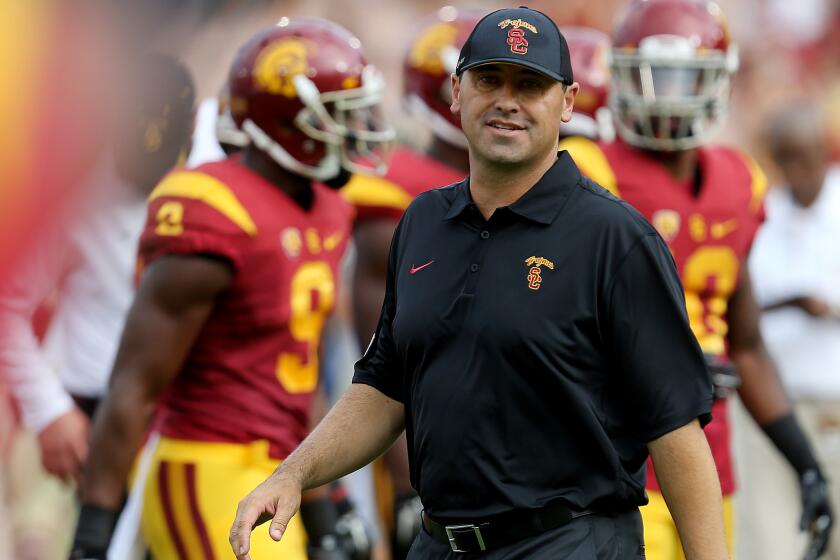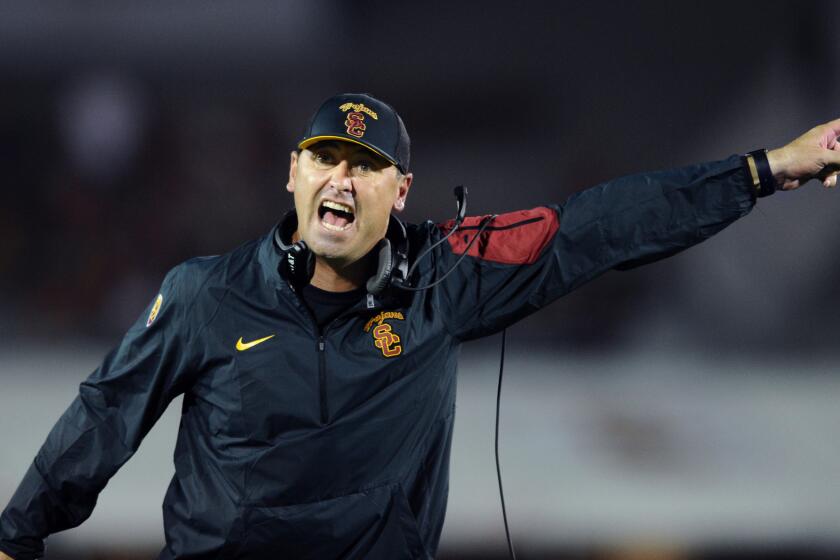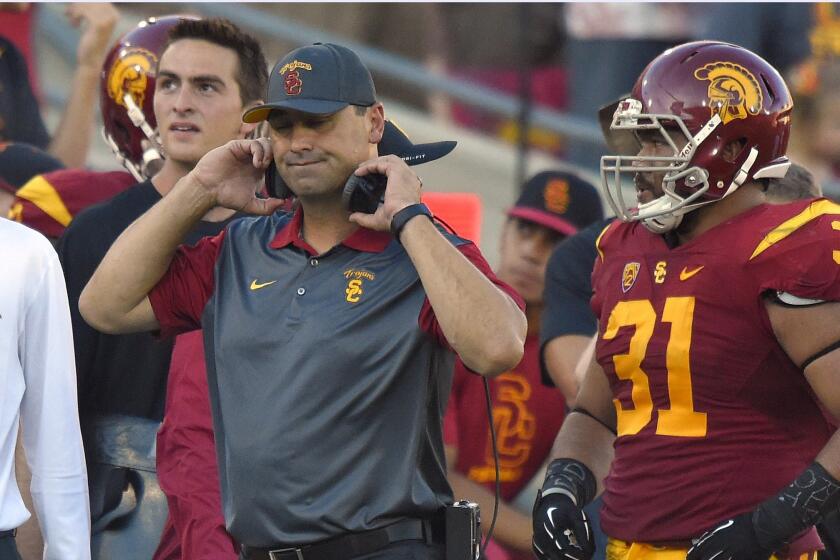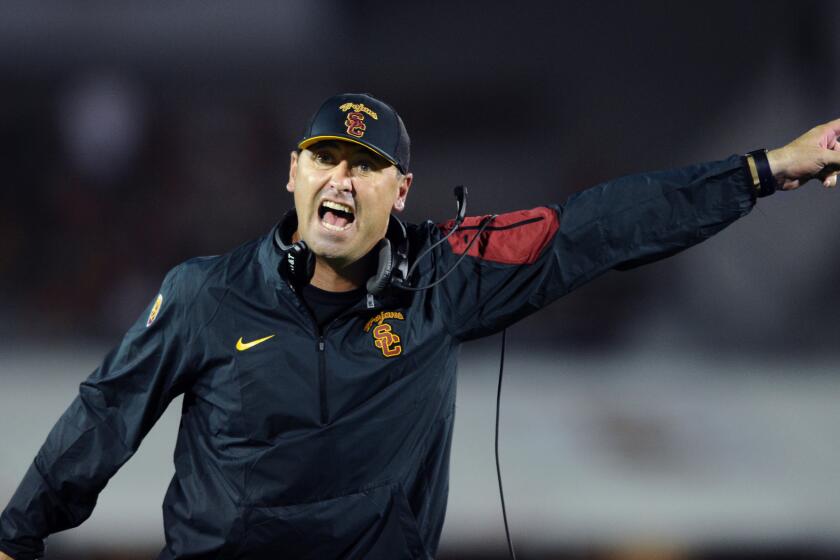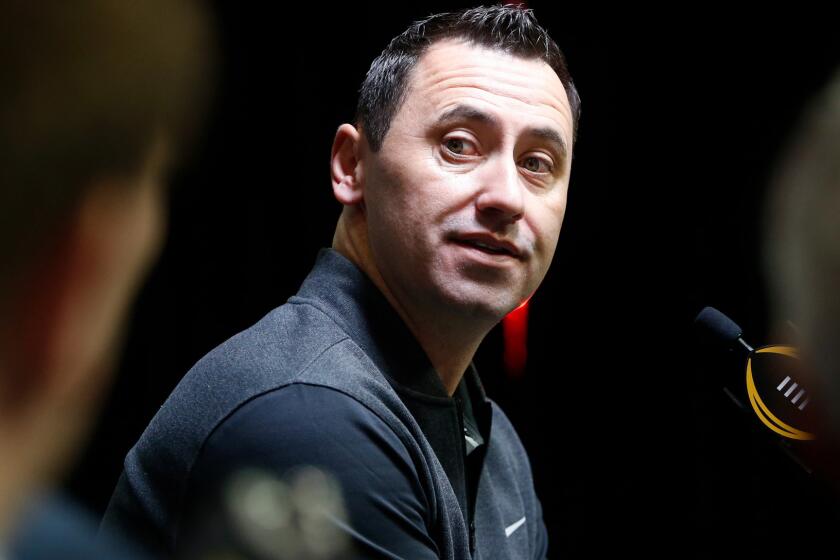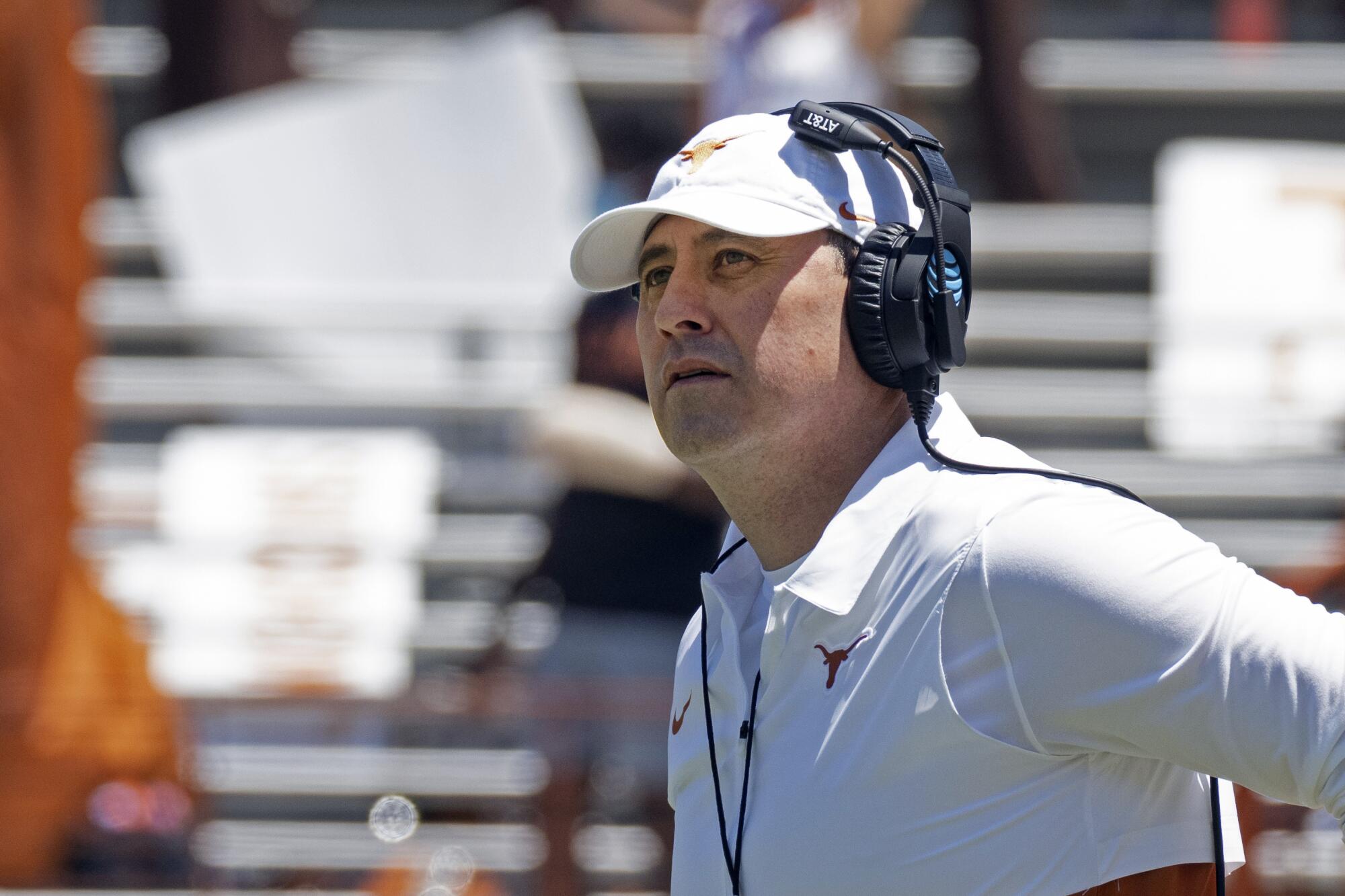
- Share via
Steve Sarkisian’s Fourth of July party was sure to be the shindig of the summer, and simply receiving an invitation made the coach’s longtime best friend feel as if he still mattered. It could have been held anywhere and David Marsden would have been excited to attend, but getting to check out Steve’s new mansion in Rolling Hills was an added bonus.
Marsden would marvel at the $8.5 million ranch-style palace befitting one of the young kings of college football in 2014. Set on five acres and surrounded by a 500-tree orchard, the property featured a 2,200-gallon koi pond, a putting green, a tennis court and a swimming pool and spa. Inside, a media room and a wine cellar with a tasting room hinted at a desire to share the good times.
For two boys from Torrance, Rolling Hills — just eight miles south — was the dream. Marsden enjoyed a front-row seat for Sarkisian’s evolution from Steve, the youngest of Seb and Sally’s seven children with a quiet confidence, to “Sark,” the brash and fiery USC head football coach whose good fortune apparently had no limits. David visited him at Brigham Young when Steve encountered fame for the first time, they took their wives on trips to Las Vegas and now they had daughters about the same age.
Faced with mounting reports of erratic behavior by its football coach, USC fired the troubled Steve Sarkisian on Monday afternoon.
“I thought our girls would be fast friends,” Marsden says. “It was hilarious watching them.”
As time went by, that day would stand out in his memory. Turned out, it would be the last time Marsden saw his best friend of more than 30 years.
After Sarkisian was fired by USC in October 2015 due to repeated incidents of intoxication on the job, Marsden, like most who weren’t around the USC football program day to day, was blindsided. Sure, he and Steve shared drinks plenty back in the day on Hermosa Beach, but he had not noticed anything out of the ordinary. He was heartbroken for Steve and searched deep for the right words.
“I sent him the most heartfelt text I’ve sent anyone in my life,” Marsden says. “I don’t even know if he ever got it.”
Not much is known about the personal struggle Sarkisian endured to get himself from rock bottom at USC to the same esteemed position leading the University of Texas football program within six years.
“One of the greatest comeback stories ever,” Marsden says.
Marsden knows how he might come off, and he wants people to understand two things: He is not angry and has no axe to grind. He also stresses he is not trying to cling onto his old friend’s well-earned notoriety. Marsden simply answered a phone call, started talking about Sarkisian and his pain trickled out like a slow bleed.
Marsden should know he is not alone. On Sarkisian’s breakneck journey back to the top at Texas, he shut out other key people from his past, including his coach and mentor at Torrance’s El Camino College, the now-deceased John Featherstone, and El Camino offensive coordinator, Gene Engle. These men were important enough to Sarkisian that he invited them to a USC spring practice in 2015 as an acknowledgment of the role they played in his development.
Later that fall, Feather and Engle called to tell him that they were praying for him, they loved him and would support him through anything. Like Marsden, they never heard from Sarkisian again.
“Other than God, who really knows what’s in the heart of a man?” Engle says. “So I can’t speak to what’s inside Steve. Both Feather and I were really hurt. It bothers me a lot.”
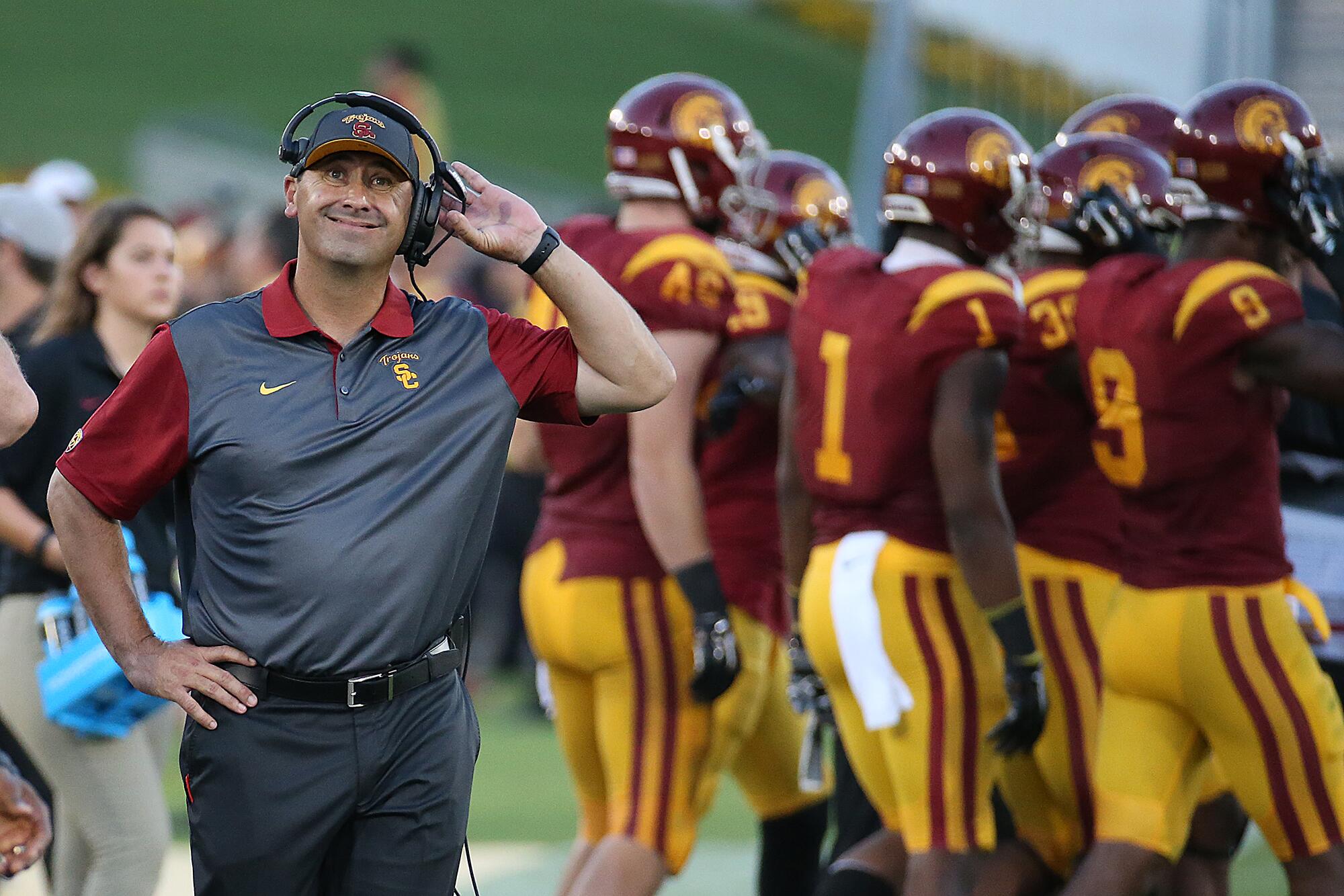
Sarkisian has shared little about his rehabilitation from alcoholism, and he does not owe the details of his recovery to anyone. Those who have remained in contact with him vouch for how hard he has worked. Most alcoholics can handle their business in private, a gentler process not afforded to Sarkisian.
“The one thing I can say about Sark is that he’s a fighter,” said Tee Martin, who played under him during his year with the Oakland Raiders and later coached under him at USC, “and when you work with him or you play for him, you get that sense right away.”
Said Steve Clarkson, noted quarterback guru who trained Sarkisian as a teenager: “You go through a crisis like that, you get to know who your real supporters are.”
It appears Sarkisian had plenty of willing support. The conflicted emotions of those left behind in Torrance like Marsden and Engle were not meant to cast further judgment on Sarkisian, but they offer a glimpse into the brutal decisions he faced to find his way forward. They were his calls to make, like them or not.
Sarkisian declined multiple interview requests for this story made through a Texas official. His family did not respond, either. The Times spoke with 20 others who played a role in Sarkisian’s life and football career.
While Sarkisian chose not to discuss his path from USC to Texas, during the last eight months he has taken advantage of a few opportunities to give his new fan base an idea of who he is — as he describes himself, a coach who thrives on building relationships.
::
On a late May evening, the proud members of the Touchdown Club of Houston are filing into an events center ballroom, eager to meet Texas’ new $34 million man.
Tickets are going for as much as $2,500 to see Steve Sarkisian’s first public appearance outside of Austin.
“When the head coach at the University of Texas comes, people want to see what he looks like, want to shake his hand,” says Bob Moses, who was a part of legendary coach Darrell K. Royal’s first recruiting class in the late 1950s. “It’s a big deal.”
If Sarkisian has any nerves about strutting back into the spotlight as the leader of a top-10 program, he’s disguising it well, looking crisp in a blue suit, white shirt and red tie. From the neck up, he could pass for a military man, his dark brown hair buzzed on the sides and back, fading to a tightly cropped top. Apparently, this is what three years at Alabama coach Nick Saban’s camp can do for a disheveled former rising star.
Today isn’t Moses’ first time seeing Sarkisian. He got a call from the coach’s secretary in the spring inviting him to meet in his office. Sarkisian nailed that introduction, asking Moses what made Royal’s teams special. They talked for an hour, and Moses departed invigorated about the future.
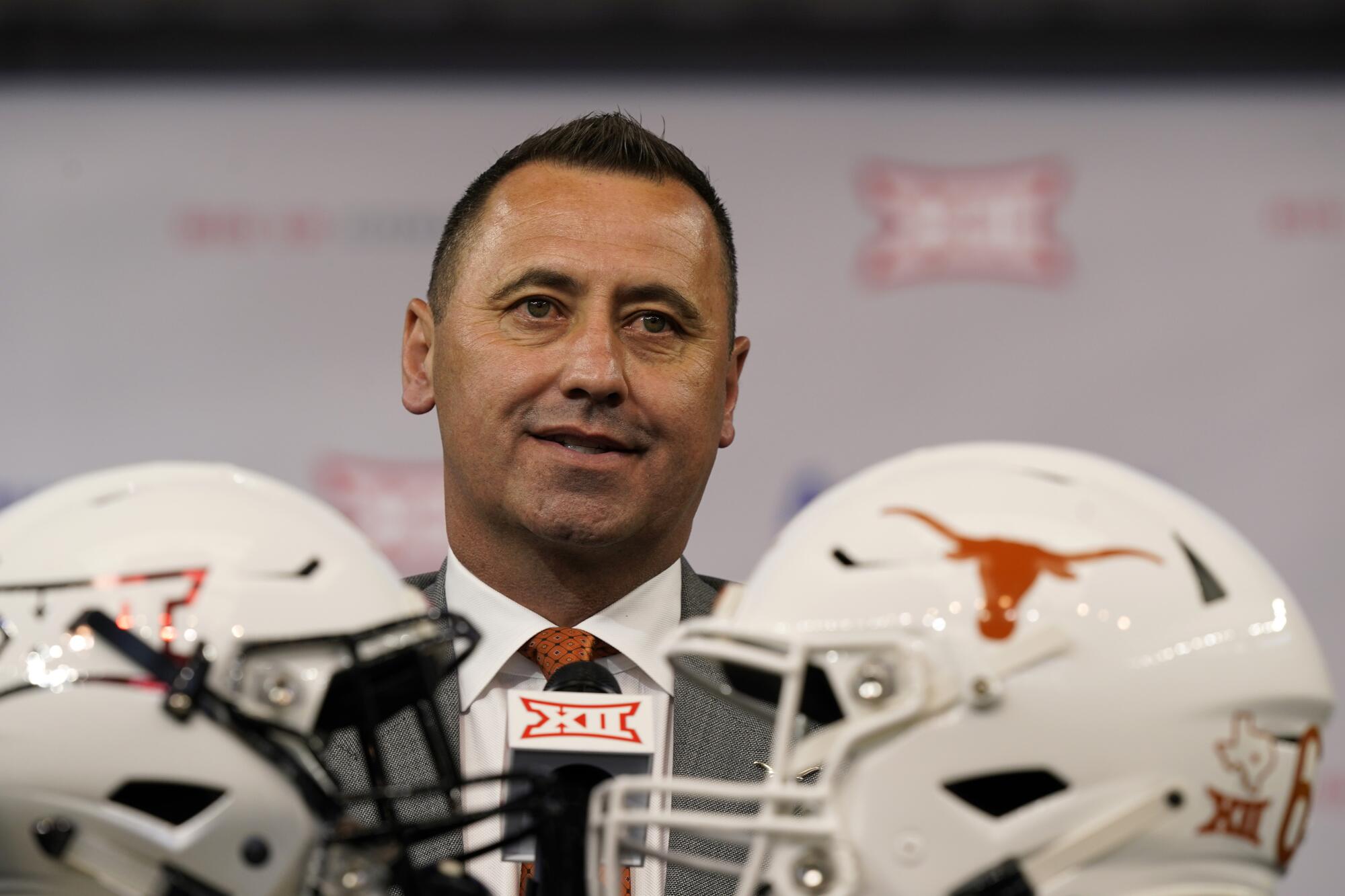
In his opinion, Sark is hitting the right notes with his audience, including asking former Longhorns who played under Royal to stand for applause.
“That makes people feel good,” Moses says.
Sark’s hands are now gripping the dais as he takes hold of the room.
“I recognize accepting this job that there comes expectations of what we want the results to be, and I’ve never shied away from that,” he says. “I’ve always wanted to go to the best.”
“ALL GAS, NO BRAKES!” a fan blurts out, citing Sark’s mantra for the Texas program that doubles as a catch-all for his approach to life.
“I feel like I came in at the right time,” Sark continues. “This is when I’m supposed to be at the University of Texas. I had my own kind of issues in my life that I had to work through, had to learn about myself. I’m 47 years old. I was a head coach at 33 when I took over the University of Washington. Fourteen years later, I’m that much better of a head coach, just the experiences, personally and on a professional level.
“I know this program hasn’t been where it wanted to be over the last decade, but the timing just feels right for us. That’s the cool part about all this coming together the way it has.”
Sark’s leisurely waltz through his career trajectory — omitting one notable dance partner, the one nestled near downtown Los Angeles — does not feel overly rehearsed. There’s a polish to him now, a smoothness that eluded him the last time he spoke in front of a large group as a head coach.
It was in August 2015 at USC’s annual “Salute to Troy” event for donors and former players, with the famed Song Girls standing behind him on stage, that the world learned what many Trojans inside the program were already figuring out — Sark might have an alcohol problem.
“Get ready to f—ing Fight On, baby!” he screamed.
That night, few in attendance could have known the context surrounding his behavior — that Sarkisian was going through a divorce, and that the breathtaking estate in Rolling Hills was in the process of being sold a year and a half after he bought it.
The turmoil surrounding USC’s football team deepened Monday with the firing of Steve Sarkisian, a troubled coach who promised before the season he would seek professional help to determine if he had a drinking problem.
Those issues traveled with him to work each morning, and the lines of what was appropriate blurred to the point players got used to their head coach drinking before practice and games.
After Salute to Troy, Sark apologized but did not admit he had an alcohol problem, saying he mixed alcohol with medication by mistake. But after the Trojans’ 17-12 loss to Washington at the Coliseum Oct. 8, Sarkisian came to a team meeting the next day clearly under the influence.
“It was incredibly uncomfortable, he was obviously intoxicated,” former USC quarterback Max Browne says. “We went onto the field and everyone is talking, whispering, ‘Hey, did you see Coach?’ ”
Sark did not come to practice that day. And when the team went back into the McKay Center, the players were informed that he was no longer going to be their coach.
“Never saw him after that team meeting, last we ever heard from him,” Browne says. “If you had told us in 2015 that Sark was going to be the head coach of the Texas Longhorns in 2021, I think everyone on that team would be surprised.”
Steve Sarkisian’s strange behavior in the days surrounding high-pressure, high-profile college football games isn’t unique to his time at USC.
Sark’s turnabout has been swift. But then again, imagine how slow the days must have felt when he arrived alone in Tuscaloosa, Ala., and started as an offensive analyst.
Within football culture, resilience is rewarded more than most traits. It is a world in which firm handshakes, looking people in the eye, showing a willingness to be humbled and putting in the grunt work can lead to overwhelming forgiveness of past missteps.
“In this country,” Moses says, “we give people second and third chances. I admire him for being strong enough to overcome that.”
Six years later, regaling a room full of Houston’s gray-haired Longhorns diehards with a disarming charm, warning them that someday soon they’re going to curse him for a play call made straight from his gut, Sark is fully back in the high-stakes game of college football, and there might be no slowing him down this time.
::
Just one year removed from leading the West Torrance High Warriors as the starting quarterback his senior year, Steve Sarkisian was stalling out. His hopes of walking onto the USC baseball team had fizzled, and he came home to El Camino College, where a seemingly small decision to enroll in a health class would change his life.
John Featherstone, the school’s football coach, was the class’s teacher. “Feather” perked up when the youngest of the Sarkisian kids entered his classroom because he had watched the boy play in high school right down the road and liked what he saw.
Feather asked Sarkisian to come out for spring football, but the young man said no. Feather was not known for accepting that answer, so he kept nudging.
“The last day of class, he goes, ‘Come on, Stevie, just toss the ball with me,’ and he caved,” relays Diane Featherstone, the coach’s widow. “Steve went out, and he goes, ‘Oh coach, I miss this.’ ”
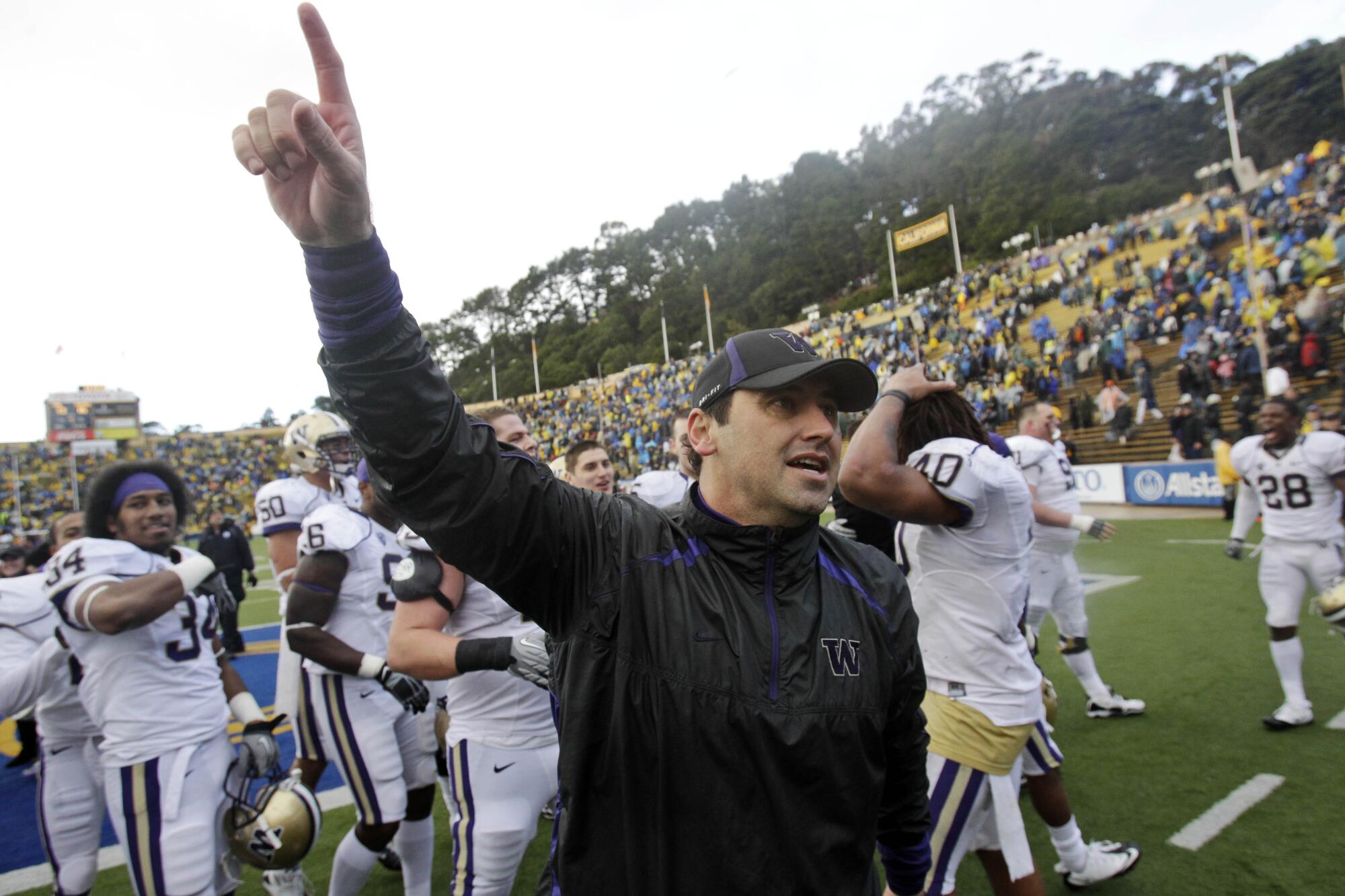
There was a fire burning in Sarkisian, and he needed only a Feather’s touch to stoke it.
“Steve, like so many who go to community college, they’re at a crossroads in their life,” Engle says. “It’s a junction point and redirects them. That’s where Steve was.”
Sarkisian was a fine high school passer but not a standout. He wanted to improve his prospects with Clarkson, the quarterbacks guru who gave Sarkisian and his dad, Seb, an honest appraisal: At 6 feet tall, he was not what scouts were looking for at the time.
“I did tell them he had a future in coaching, and I kind of ticked them off,” Clarkson says with a laugh. “We didn’t speak for a while after that.”
Sarkisian excelled at El Camino, and BYU, one of the best quarterback grooming programs under head coach LaVell Edwards and offensive coordinator Norm Chow, took notice.
In 1995-96, Sarkisian started for the Cougars and threw for a combined 7,400 yards and 53 touchdowns.
“When I went to visit him at BYU, he was a god,” says Marsden, Sarkisian’s longtime friend. “All of a sudden people on the streets wanted his autograph.”
Sarkisian followed his football dream as far as Saskatchewan, where he quarterbacked the Canadian Football League’s Roughriders. When it ended, he came back to Torrance and began working as an uncelebrated software sales employee. He was also doing a little substitute teaching on the side.
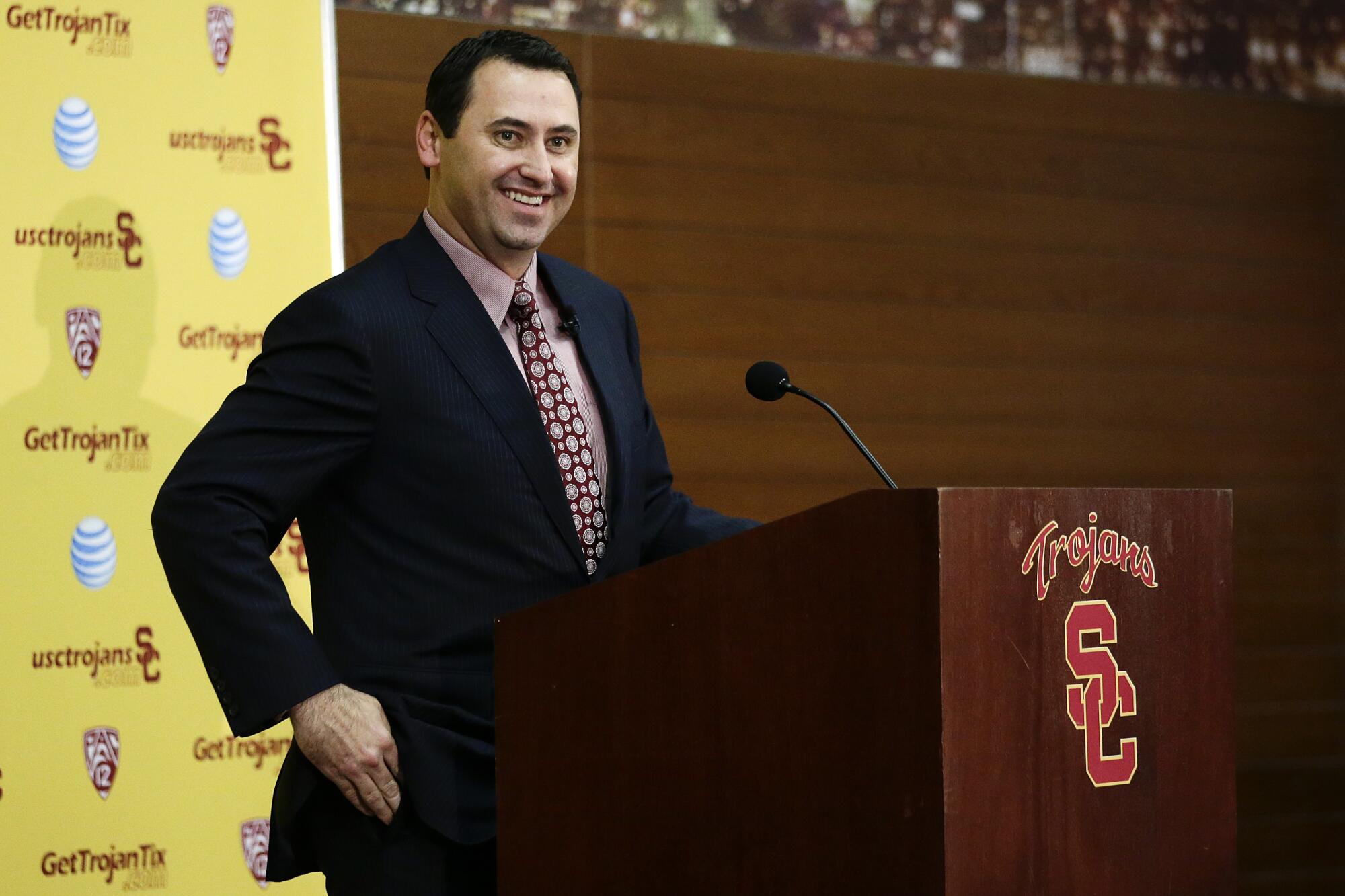
“Those jobs, he was a fish out of water,” Marsden says. “Going from being a semi-god in Utah to a substitute teacher, that’s quite a shift. He needed to compete.”
Predictably, it was Feather who would swoop in again, convincing Sarkisian to help coach at El Camino. In 2001, when Pete Carroll took over USC and hired Chow to be his offensive coordinator, Chow was looking for a graduate assistant. Clarkson reminded Chow that his former pupil was now coaching at El Camino and available.
Nearly a decade after he couldn’t cut it for USC baseball, Sarkisian was a Trojan once more, and he would pour everything he had into making it stick this time.
“He would get picked up by Norm Chow at like 4 a.m. and then get dropped off at midnight,” Marsden says. “I could see his eyes, bloodshot red. You’re talking every day, no sleep, and he had a newborn. I don’t know how he did it.”
It was more of the same in 2004 during Sarkisian’s year as quarterbacks coach for the Raiders.
“I asked Steve about it, and he said, ‘I would spend nights at the office working because Al Davis is always there, and I just didn’t want to fail,’ ” recalls John Black, Sarkisian’s coach at Torrance West.
His sacrifice would pay off soon. In 2007, he would take over the USC offense, and in 2009, Washington, then a dormant Pac-10 power, would come calling.
The dispute between USC and Steve Sarkisian over the football coach’s abrupt firing in 2015 ended last week when the school prevailed in an arbitration hearing.
But even as his national profile rose, along with the daily pressures, Sarkisian tried to stay connected to his past and the people who helped him along the way.
One time, the night before a Huskies game, Sarkisian invited Feather to come speak to the team for one of his patented pep talks.
“I’ll never forget the welcome that Sark gave Johnny,” Diane says. “Just the love that I saw …”
El Camino’s motto — “Once a Warrior, always a Warrior” — was ringing true. Another time, Sarkisian was in the South Bay to recruit star cornerback Adoree Jackson to Washington, and he took the time to pop by El Camino, unannounced.
“In that moment, it was just like he was still playing at El Camino,” Engle says. “He didn’t come in like ‘I’m the big coach’ and all that stuff. He was just really down to earth. We had a great conversation.”
And when USC brought Sarkisian back as head coach in December 2013, Feather and Engle could justifiably beam that “Stevie” had returned as something of a hometown hero.
Sark was happy to embrace that storyline, too. At his first Pac-12 media day, he referred to himself as “proud to be that kid from Torrance.”
“I’m one of them,” he said.
::
One of the few details Sarkisian has revealed about the days that followed his USC firing was that he was finally inspired to seek treatment for alcoholism after watching ESPN anchor Scott Van Pelt give a commentary about Yankees pitcher CC Sabathia leaving the team before the 2015 playoffs to address his alcohol problem.
“I thought to myself, ‘Whoa, here’s somebody who is like me, who is in a very high-profile position in sports, and was being relatively commended or almost celebrated for going to do what he did,’ ” Sarkisian told ESPN.com years later.
After Sarkisian completed rehab, as he noticed with the empathetic reception for Sabathia, the world quickly began to open up to him. Lane Kiffin, his friend from their time at USC, was now at Alabama and tried to convince Sarkisian to get back into coaching by joining Nick Saban’s staff. Sarkisian visited Tuscaloosa but told Kiffin he was still more intrigued by an offer to do on-camera work for Fox in the fall of 2016 because he could stay in L.A. and be close to his three kids.
But, at the end of the summer, Sarkisian had a change of heart.
“When he got to Alabama, he’d gotten a lot stronger with it, built up a lot of work,” Kiffin says. “And that’s not easy, especially in a college coaching environment where drinking is all around, and on the other side of the country, away from your kids. … I wouldn’t consider that sober living. You don’t have kids to go home to at night, and there’s free time. You have to set a schedule and manage yourself not to relapse.”
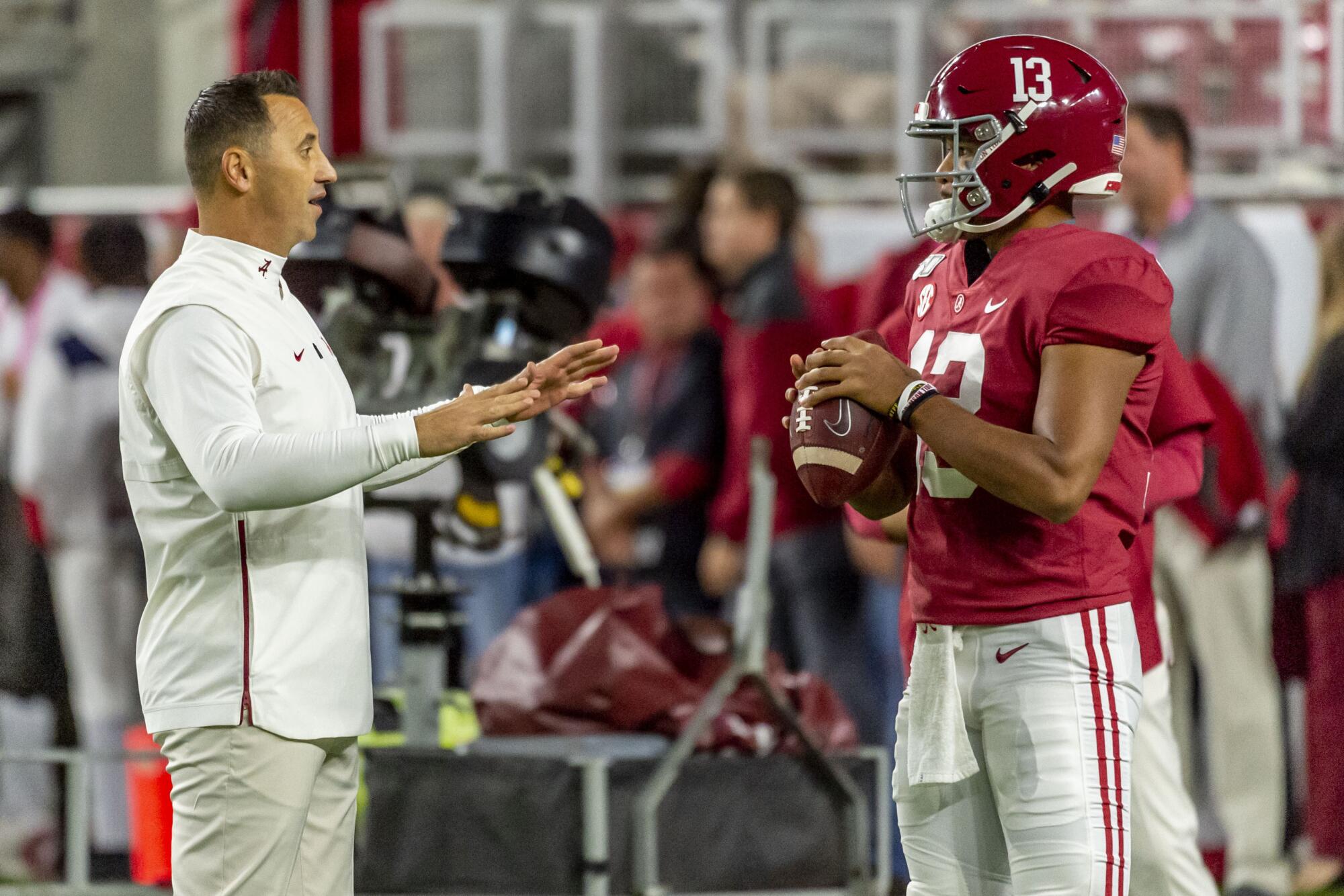
After a year as an analyst at Alabama, Sark was hired as the Atlanta Falcons’ offensive coordinator — a big jump in responsibility and pressure, with the Falcons coming off a Super Bowl appearance.
Kiffin said that job was attractive to Sark at the time because he could fly back to L.A. to see his kids more easily out of Atlanta.
“Certainly I think he was going through a lot,” said Bush Hamdan, the Falcons’ quarterbacks coach at the time. “I really found him to be an authentic, genuine person who cared as much about the relationships as the football.”
Hamdan said Dan Quinn’s staff in Atlanta went out of its way to respect the seriousness of Sark’s challenge.
“It’s your job to make sure when you go to dinner, he’s not around that,” Hamdan says.
Sark’s offenses in Atlanta had mixed results. The Falcons let him go after the 2018 season, but, fortunately, Saban had seen enough promise in 2016 to offer him the keys to a revved up Alabama offense.
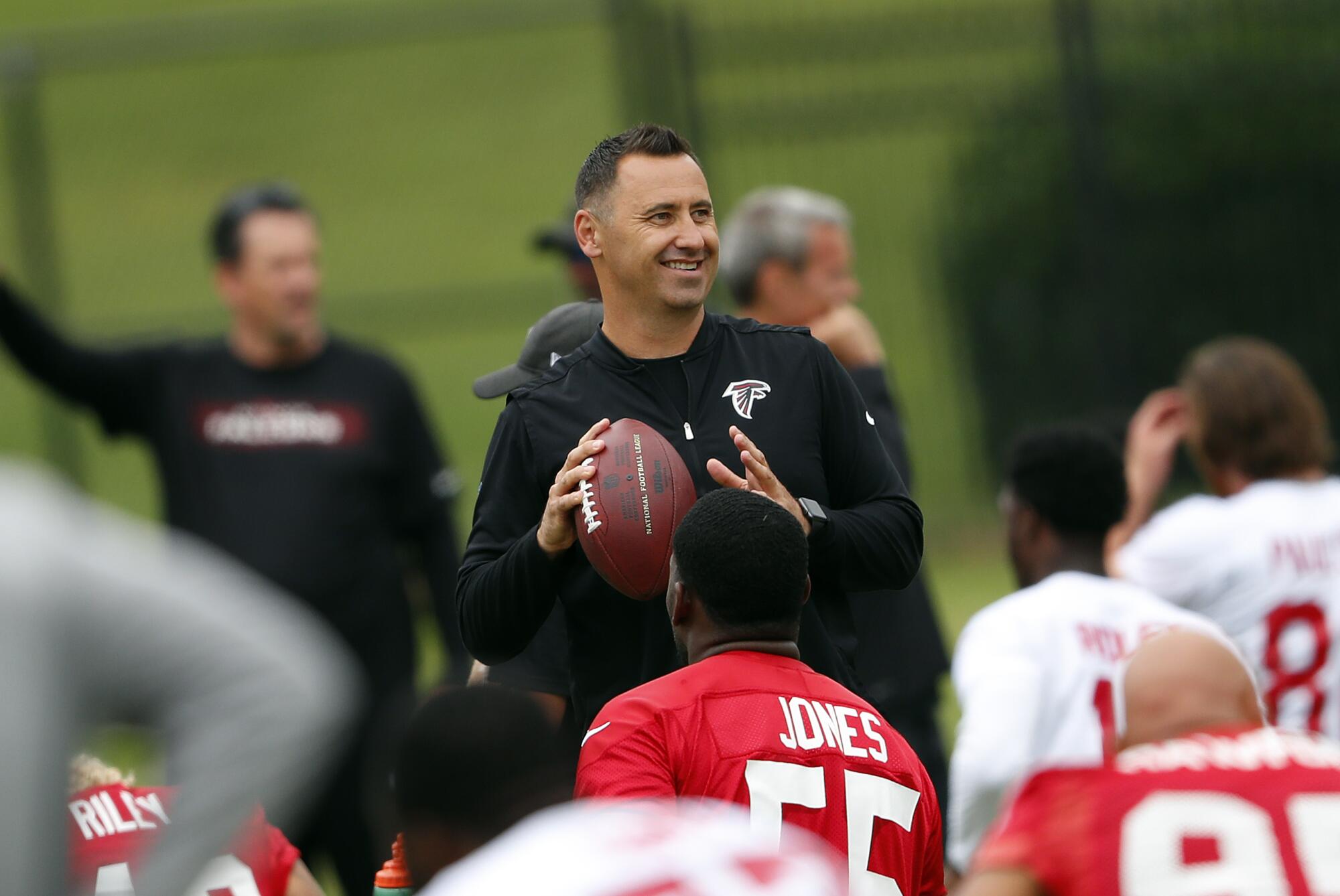
Upon Sarkisian’s return to Tuscaloosa in January 2019, the top quarterback in the 2020 recruiting class was Santa Ana Mater Dei’s Bryce Young — who had given a strong pledge to none other than USC. Sarkisian’s son, Brady, played for Mater Dei at the time, and Sarkisian had known Mater Dei coach Bruce Rollinson for nearly two decades. He saw an opening and hit the gas.
Along his recovery track, quietly working as a college analyst and an NFL coordinator afforded him some personal insulation to get started. Returning to his Southern California roots and recruiting the sons of hyper-attentive parents who knew what happened at USC would require an extra level of intimacy and courage.
The way Rollinson saw it, Sarkisian’s past issues were none of his business. He was just happy to see him again.
“He came in, the energy hadn’t changed, the smile hadn’t changed,” Rollinson says. “I’m pulling for Steve Sarkisian, and I think he knew that.”
Says Craig Young, Bryce’s father, “Sark never hid or ran away from what had happened. He was very straightforward, honest about that situation and just said he’s at a different place in his life and that wasn’t him anymore. He came across very sincere, and I believed it instantly.”
Former USC football Coach Steve Sarkisian — still locked in a legal battle with the school over his 2015 firing — will join Alabama’s staff as an analyst, the team announced Monday.
Craig is a mental health therapist, so he has seen a lot of people dealing with trauma. He took Sarkisian at his word and they began to build a deeper relationship while Bryce maintained his commitment to USC. The family was hesitant to engage, but Sarkisian read the situation astutely: The Trojans were not on steady ground under his successor and former assistant, Clay Helton, and he knew he had time on his side with a year until Signing Day.
Sark had an easy product to sell in Alabama, and he emphasized repeatedly to Bryce that he had eyes for only one quarterback. When Young took his official visit to Alabama, Sark was ready to pounce. He put on film of a bunch of throws Alabama quarterback Tua Tagovailoa made and showed clips of Young making similar throws at Mater Dei.
“He breaks down film, and you just realize this guy’s on another level,” Craig says. “When he talks football with you, he doesn’t beat you over the head with how smart he is. It’s natural, not forced. He explains complex things very simply and gives you the confidence that you can do this.”
No-nonsense, rarely smiling, control-freak Nick Saban is a gambler. Who knew?
In September 2019, the Youngs called Helton and let him know that they were going to choose Alabama. They felt terrible. Minutes later, they got to enjoy the fun part. They called Sark and told him the good news.
“Let’s go win a national championship,” the coach said.
“It ultimately focused us on what this decision was about,” Craig says. “And it was about being coached by the best, and that’s what Sark represented to us.”
Sarkisian lost his wrongful termination case against USC, but he had hit the Trojans where it counts for the first big recruiting win of his coaching rebirth.
Two years ago, the Youngs never could have predicted that, when Bryce makes his first career start Saturday against Miami, Steve Sarkisian would be on another sideline coaching another quarterback. But then again, the man does move fast.
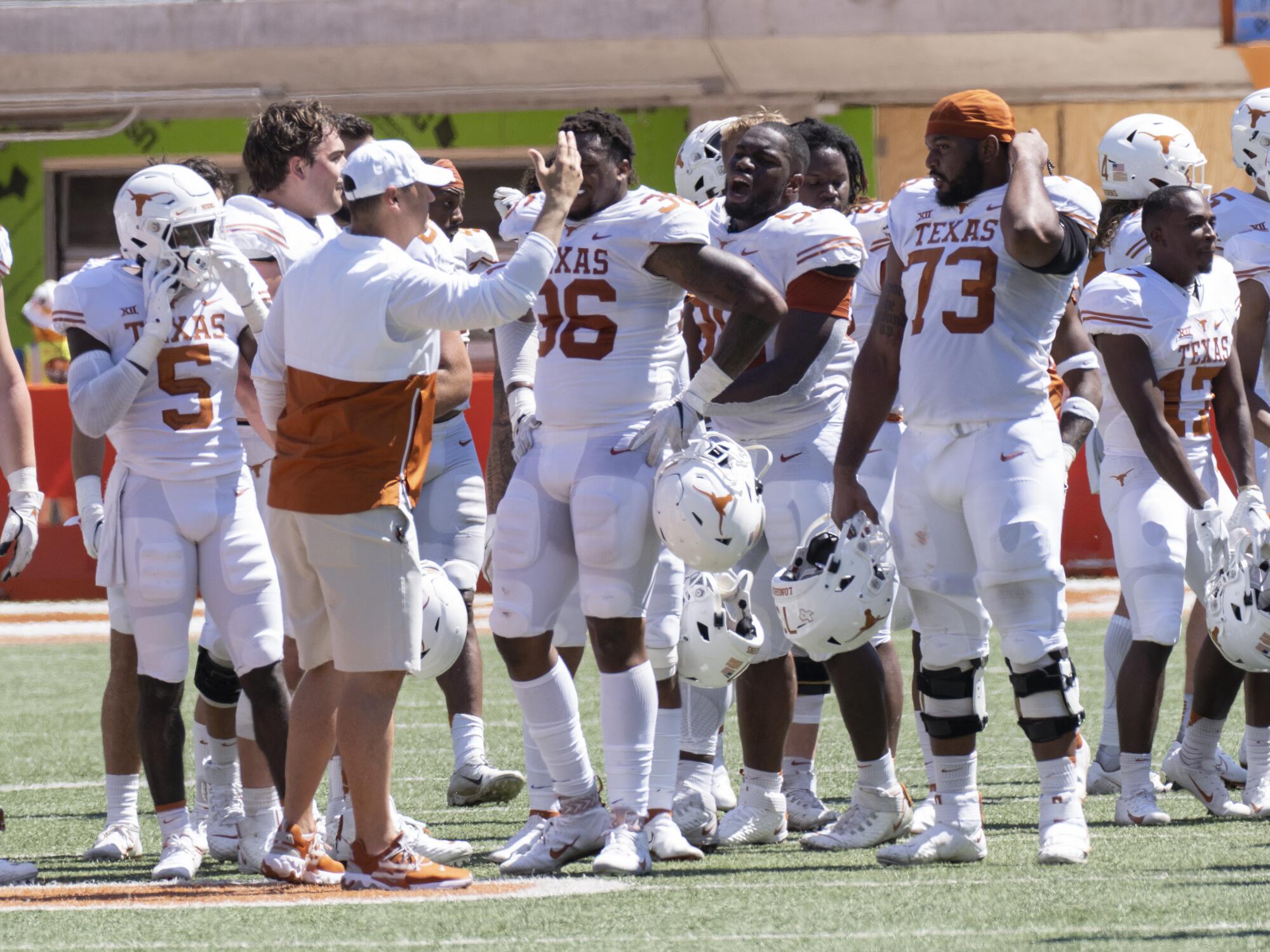
::
Around New Year’s, Lane Kiffin heard from Sark.
“There was something really big going on,” Kiffin says, “but he couldn’t tell me what school.”
Soon Kiffin, now the head coach at Mississippi, would find out like everyone else that Sark had been tapped by Texas to be head coach just hours after firing Tom Herman.
“It’s an amazing story, really a miracle,” Kiffin says.
With the Longhorns headed to the Southeastern Conference in 2025, chances are Kiffin will be coaching against his buddy soon enough.
“I think he’s really dangerous now,” Kiffin says, “because he’s always had the offense, always had the recruiting, now you go to Nick Saban and you get the organization. Look out. You put a top-10 national program with the Sark that he is now, you’re going to be talking about the playoffs here really quick.”
Just like at Alabama, once at Texas, Sarkisian wasted no time going after a top quarterback from Southern California, earning a commitment from Gardena Serra’s Maalik Murphy, the 10th-ranked quarterback in the 2022 class.
“I don’t think I would have ended up at Texas if it weren’t for him,” Murphy says. “When he got there, it was a different feeling.”
Now that he’s back at the wheel of a major program, his comeback complete, maybe someday Sark will attempt to reconnect with a part of his L.A. life he has tried to forget.
During this second steep ascent to the top of his sport, those who knew him as “that kid from Torrance” have worked to find joy in his latest success and put the hurt aside.
Feather developed a severe case of Alzheimer’s disease after retiring from El Camino in 2015. He didn’t remember many people, but Sark was one of the few names he would bring up to his wife, Diane. But they didn’t have any luck getting Sark to correspond with Feather.
“He’d ask me, ‘How’s Sark?’ and I’d have to say, ‘Well, I don’t know honey,’ and that makes me cry, too, because I wish they would have had more contact,” Diane Featherstone says. “I knew he was going through a lot, especially toward the end of Johnny’s life. I really didn’t know what Sark was thinking at that point.”
When Feather died March 20 at age 71, Sark wrote an Instagram post about the man who lit the football fire inside him. It began, “A mentor, coach, teacher, confidant and friend.”
“We always knew that they loved each other,” Diane says. “I know Steve had to withdraw. That’s what he needed to do for himself in order to get well.”
Engle recently reached out to Sark about his inclusion on El Camino’s 1990s All-Decade team. He did not hear back, which at this point was to be expected.
“I think he should have owned up to that to at least explain, ‘This is too painful for me, I just need to move on,’ ” Engle says. “Maybe Steve was so embarrassed that he had let us down that he couldn’t face us, but I still don’t think that excuses it.
“You can’t run from the past. That’s like denial. It’s going to resurface. One of the steps of AA is to go back and make amends to those people you’ve hurt. You always try to make amends, unless doing so would create more harm.”
Only Sarkisian could explain why he has handled some of his formative relationships this way, and he chose not to.
“I wasn’t always rooting for him at times,” admits Marsden, his longtime friend, “but I noticed that in those times I wasn’t happy with my own life. When you’re happy with yourself, you want nothing but good for others. As time went on, I kind of realized why he had to distance himself. I don’t hold any hard feelings.”
Marsden still lives in Torrance, near the old neighborhood, and drives past the Sarkisian house almost daily. The other day, Marsden noticed Sark’s dad, Seb, standing in the front yard. Marsden could have kept on going, but this time, he pulled the car over, shared some small talk and made sure Seb left the conversation knowing one thing: He wishes nothing but the best for Steve.
More to Read
Go beyond the scoreboard
Get the latest on L.A.'s teams in the daily Sports Report newsletter.
You may occasionally receive promotional content from the Los Angeles Times.

